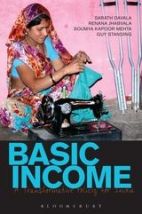Basic Income: A Transformative Policy for India

This book reports on two projects piloting basic income transfers in Madhya Pradesh, India. In projects funded by UNICEF and coordinated by the Self-Employed Women’s Association (SEWA), the 6,000 residents of nine villages received a very modest amount for 1 ½ years: Rs. 200 (less than US$ 3) per adult and Rs. 100 per child per month (increasing by 50 per cent in June 2012 on account of inflation). This amounted to about 30 per cent of monthly expenditure for those under the poverty line.
The authors first review previous approaches to poverty reduction in India, from food subsidies to public works jobs. These have been beset by a range of problems, including difficulty in targeting the individuals who should be prioritized for assistance, and making the assistance conditional on certain behaviours. Davala et al. argue that targeting and conditionality are administratively burdensome and exclusionary in practice, making a universal model best for alleviating poverty. They also summarize the debate around the principles of basic income, and other attempts to put these principles into practice.
They then explain the practicalities of designing, implementing and evaluating the pilots. The villages receiving basic incomes were compared to 12 control villages that received no transfers. (The authors do not explain whether the site selection caused inter-village resentment.)
Countering critics’ expectation that providing a basic income would lead to squandered spending, the beneficiaries quickly made improvements to basic living conditions, nutrition, schooling, and other areas. By the end of the pilot, almost twice as many households in the basic income villages that did not previously have a latrine in their home now possessed one, compared to the control villages. Consumption of fresh vegetables in the basic income villages increased by 888 per cent. And illness levels were lower in the basic income villages than in the control villages.
The authors believe firmly in the transformational power of unconditional cash transfers. A key example of this from the Madhya Pradesh work concerns indebtedness, which is chronic and common in the area. Among the households that received basic incomes, debt was dramatically reduced both early in the pilot and after it concluded. Not only was the basic income amount used to pay off existing debt, it also reduced the likelihood of individuals securing more – and more exploitative – loans. In the authors’ view, this reduction of debt burdens not only reduced poverty in the short term; it also had potential for transforming the village’s customary relations of debt bondage, which was not possible with other poverty relief mechanisms like subsidized food.
It may be harder to asses the claims around changing conceptions of citizenship and increasing empowerment of women and other marginalized groups. But Basic Income argues that this type of financial security is emancipatory for all, especially those previously excluded from decision-making power. The book also contends that basic income payments would be affordable, at least in rural areas, when compared with the bundle of inefficient social protection schemes currently in place. Affordability remains a larger concern in cities.
Further reading:
Forget, Evelyn L, Alexander D Peden and Stephenson B Strobel (2013), “Cash Transfers, Basic Income and Community Building”, Social Inclusion Vol 1, No 2, pages 84–91, available at http://www.cogitatiopress.com/ojs/index.php/socialinclusion/article/view/113.
Jones, Nicola, Rosana Vargas and Eliana Villar (2008), “Cash transfers to tackle childhood poverty and vulnerability: an analysis of Peru’s Juntos programme”, Environment and Urbanization Vol 20, No 1, pages 255–273, available at http://eau.sagepub.com/content/20/1/255.abstract.
SEWA Bharat (2014), A Little More, How Much It Is…: Piloting Basic Income Transfers in Madhya Pradesh, India, New Delhi, 203 pages, available at http://sewabharat.org/wp-content/uploads/2015/07/Report-on-Unconditional-Cash-Transfer-Pilot-Project-in-Madhya-Pradesh.pdf.
Smith, Gabrielle and Lili Mohiddin (2015), “A review of evidence of humanitarian cash transfer programming in urban areas”, Human Settlements working paper, International Institute of Environment and Development, London, 64 pages, available at http://pubs.iied.org/10759IIED.html.
Book note prepared by Christine Ro
Search the Book notes database
Our Book notes database contains details and summaries of all the publications included in Book notes since 1993 - with details on how to obtain/download.
Use the search form above, or visit the Book notes landing page for more options and latest content.
For a searchable database for papers in Environment and Urbanization, go to http://eau.sagepub.com/

